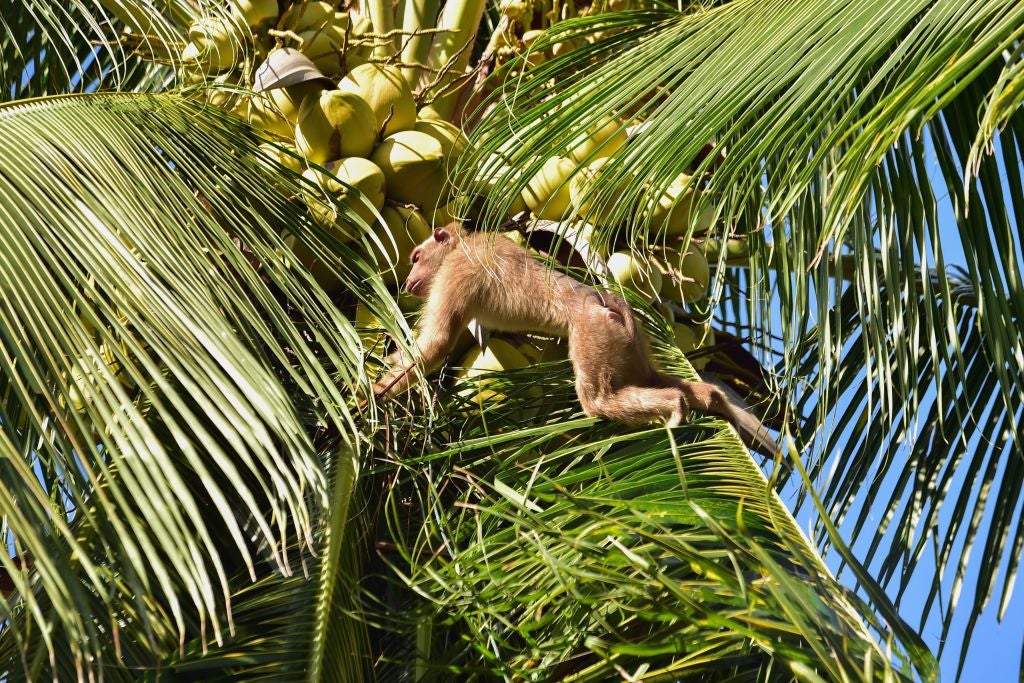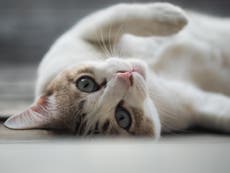2020 was a bad year for humans but a good one for animal rights – here are the eight biggest achievements
Wildlife enjoyed open space in locked-down towns, and our dog and cat companions relished extra time with their loved ones. And that’s not all


Let’s be honest: for many of us, 2020 was a no-good year. But for scores of animals who suffer under “business as usual”, the year offered some reprieve. Government lockdowns cancelled annual events like the Running of the Bulls in Pamplona, Spain, and the subsequent bullfights in which 48 bulls are stabbed to death every year, as well as the Grand National, in which horses are whipped and forced to run to – and sometimes past – their breaking point. Wildlife enjoyed open space in locked-down towns, and our dog and cat companions relished extra time with their loved ones. And that’s not all.
All major UK supermarkets dropped coconut milk tied to monkey labour
PETA Asia blew the lid off the Thai coconut industry’s use of captive monkeys. A shocking investigation revealed that terrified young monkeys in Thailand are kept chained, abusively trained, and forced to climb trees to pick coconuts that are used to make coconut milk. After viewing the disturbing footage, more than 26,000 stores – including Morrisons, Ocado, and Sainsbury’s – have stopped stocking coconut brands that fund monkey abuse.
Horse-drawn carriage rides were put out to pasture
This year saw Rome and Chicago ban horse-drawn carriages rides from city roads, meaning horses will no longer be forced to pound the pavement through all weather extremes and navigate busy streets while hauling heavy loads and breathing in exhaust fumes. Egyptian tourism authorities have also responded to public pressure from PETA by announcing plans to ban not only horse carriages but also camel rides at Giza’s pyramids and other archaeological sites. Instead, tourists will have access to electric cars and buses. The announcement is a big victory for all the camels and horses who are forced to haul visitors on their backs or in carriages in the blistering heat without food, water, or shade.
French legislators made magnifique strides towards compassion
French legislators introduced policies that will close mink fur farms, ban the use of wild animals in travelling circuses, and spare intelligent orcas and other dolphins a lifetime of loneliness in marine parks. When announcing the changes, the French ecology minister stated: “It is time to open a new era in our relationship with these animals.” And so it is. The decision reflects the urgent need for us to redefine our relationship with other species away from domination and towards respect.
The world’s first beluga whale sanctuary welcomed its first residents
Little Grey and Little White – beluga whales who had been imprisoned and forced to perform for nearly a decade at a cruel marine park in China – gained their freedom at a seaside sanctuary in Iceland, where they can swim free at long last. The groundbreaking move has renewed calls for SeaWorld to follow suit and move the incarcerated belugas, orcas, and bottlenose dolphins at its parks to seaside sanctuaries, where they can have some semblance of the life they’ve been denied for so long.
The trades in animal skin, wool, and hair took hits
Countries including the Netherlands and Poland took steps to shut down fur farms in 2020 – a decision made all the more urgent given that mink farms have been found to be hotspots for the novel coronavirus. Sephora and other major beauty brands banned mink eyelashes, for which stressed minks are confined to cramped, barren cages before being killed for their fur. Large British clothing brands including Marks & Spencer and Ted Baker and Italian fashion house Valentino vowed to stop using alpaca fleece, which is violently shorn from scared, crying animals.
A sheep farmer was convicted in a landmark legal case in Scotland
In what was hailed as a landmark case, a Scottish sheep farmer pleaded guilty to cruelty to animals after a PETA Asia investigator filmed him punching and kicking sheep in the face. It’s the first time that a Scottish court has convicted a farmer of causing unnecessary suffering to animals during the shearing process, sending a strong message to animal abusers that their actions have consequences.
Scientists moved away from cruel, archaic animal experiments
In 2020, many large food companies said “no” to unnecessary animal testing, including chocolate giant Barry Callebaut. The Taiwan Food and Drug Administration dropped a requirement that companies undertake animal testing to make anti-fatigue claims about their food products. King’s College London and the University of Adelaide in Australia both ditched the widely discredited forced swim test, in which animals are often dosed with a test substance, dropped into an inescapable beaker of water, and made to swim frantically. The institutions join large pharmaceutical companies, including Pfizer, Johnson & Johnson, and Bayer, which also banned the test after talks with PETA and our affiliates.
Speciesism took centre stage
When Joaquin Phoenix, a lifelong vegan and PETA’s 2019 Person of the Year, accepted the Oscar for Best Actor, he used his moment in the spotlight to shine a light on speciesism. Standing in front of a worldwide audience, he spoke eloquently about injustice, saying that humans “feel entitled to artificially inseminate a cow and steal her baby, even though her cries of anguish are unmistakable”. He continued: “Then we take her milk that’s intended for her calf and we put it in our coffee and our cereal.” He also said that we should fight injustice in all its forms because no “one nation, one people, one race, one gender, or one species has the right to dominate, control, and use and exploit another with impunity”. If we take something with us into 2021, let it be this.
Elisa Allen is the director of Peta UK




Join our commenting forum
Join thought-provoking conversations, follow other Independent readers and see their replies